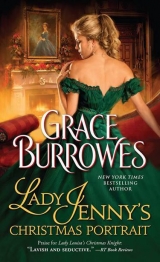
Текст книги "Lady Jenny's Christmas Portrait"
Автор книги: Grace Burrowes
сообщить о нарушении
Текущая страница: 9 (всего у книги 19 страниц)
Nine
Genevieve Windham was brilliant.
She’d seen promise in the sketch of the boy with the old hound, while Elijah had dismissed the effort as unorthodox and off balance. The issue became how to get both boys into the hound’s ambit, and create an image so perfectly composed it appeared spontaneous.
“We wondered if you might start without us.” The lady herself appeared in Elijah’s studio, William affixed to her hip, Kit grasping her hand.
She’d brought the children herself, no harried nursemaid in tow, and the tableau of Genevieve with the children did something queer to Elijah’s insides.
“Good morning, my lady.” He offered her as cordial a bow as he knew how to give, which was cordial indeed. Considering her lack of intimate experience, he hadn’t expected her to risk his company over the breakfast table, but he had wondered if she’d brave the studio today. “You are looking exceptionally well this morning.”
She set William down, and the boy predictably charged over to the hound dozing by the hearth. “Jock! Ride!”
The dog sighed. Kit dropped his aunt’s hand. “Can we wreck the card houses today, Aunt Jen?”
“We’ll see.” She watched Elijah as if he were about to pounce on her, which would have served nicely had the children not been present.
“I missed you at breakfast, my lady.” He could not have told her what he’d eaten, because he’d been so busy staring at the doorway and willing her to appear in it.
The light in her eyes shifted, became less guarded. “I missed breakfast. I slept late, so I took a tray.”
Last night, she’d said she’d miss him too, when she went to blasted, bedamned Paris. Her ambition had apparently coalesced into determination, and yet, he could not allow her to go to Paris.
This thought—this fact—had crystallized in his mind before he’d drifted off to sleep. He’d escorted her to her room—a mere three doors down the guest wing corridor—taken himself to bed, then tended to his own needs within five minutes of kissing her good night.
The relief had been temporary and inadequate, and as he lay among the pillows and covers, he’d come to the conclusion that Jenny Windham had nowhere near the sophistication needed to manage the predators lurking among the artists of Paris.
And yet, she’d hate him did he thwart her scheme.
“Maybe I could take a turn building the house of cards,” Elijah suggested. “Though I would, of course, need an assistant.”
“Me!” Kit yodeled.
Lady Jenny was indeed an experienced aunt. She affected a pout. “And then what am I to do? You fellows will have your fun, and I shall be left to sit by myself, with nothing to do, all alone, not even Jock to play with—”
“C’mon, Aunt Jen. I’ll help you too.”
Elijah suggested Kit choose the cards, making sure that knaves were paired with knaves, and queens with queens, and Jenny was to build the structure. William mounted up on his sleeping canine steed and sang a happy-little-boy tune no composer would recognize and no parent would mistake.
As William took up the reins of Jock’s ears, Elijah sat on the raised hearthstones and sketched. Excitement hummed along in his veins, a visceral recognition that he’d found the arrangement that would make a worthy portrait.
The point of view was only slightly from above, so that the shining crown of Jenny’s head was in evidence as she bent to peer over Kit’s shoulder. The feel of the angle was intimate, though, a child’s-level view of a relaxed morning.
Lines and shadows arranged themselves into a small boy’s smile and a sleeping dog’s contentment. While the fire crackled cheerily, the house of cards steadily grew, and Genevieve Windham’s hands became a subtle point of interest in the sketch.
When she sat back to admire her little card palace, Elijah caught her smile—loving, but always a bit wistful when in company with the children. He caught the way the boys looked at her too. They adored this relation who was as pretty as their mama, and never quite so stern. They adored her humor and affection, her gentleness, and her abiding regard for them.
The house of cards rose higher. Jock’s back leg twitched as he dreamed his doggy dreams, and William left off riding his gallant steed long enough to accept the knave of spades from his brother.
“Careful,” Jenny cautioned. “William is going to want to—”
On a gleeful cry from William, the knave went sailing into the upper stories of the palace, destroying twenty minutes of careful work.
William clapped his chubby hands then turned to Elijah, arms outstretched. “I-unt-up!”
The palace rose and fell several more times, Jock rolled over, and Elijah completed a detailed sketch of Jenny with her nephews. William occasionally supervised from Elijah’s side, then toddled forth to wreak destruction like a one-boy Vandal horde.
Jenny presided over it all from her spot on the rug, a serene, smiling presence with endless patience for busy little boys and their portraitist.
She would be wasted on Paris. Elijah started another sketch on the strength of that conclusion, a study of Jenny’s face as she regarded Kit’s efforts to find “an ace with a blood-colored diamond” on it.
Her smile, indulgent, tender, and yearning, said she even loved the child’s choice of words.
The door opened, something Elijah perceived with the part of his brain set aside for keeping track of matters not related to his sketch, like a porter’s nook in the front chamber of a grand house.
“Beg pardon, your ladyship. Shall I be taking the boys now?”
The nursemaid’s arrival would have been cause for much relief the day or two previous. “Another moment,” Elijah muttered, pencil flying.
“Soon, Norquist,” Lady Jenny said. “We were about to finish up.”
As he forced himself to retreat from the world of his sketch, Elijah realized the boys were trying to start a squabble over some lower order of card—a three?
“I-unts” became increasingly vocal, interspersed with “It’s not your turn,” until Elijah had to set his drawing aside and scoop William up in his arms.
“What you want,” he informed the child, “is a stout tickling.” He scratched lightly at the boy’s round tummy, provoking peals of merriment. William’s laughter, surprisingly hearty coming from so small a body, sounded to Elijah exactly as Prudholm’s had when that worthy was still small enough to tease and tickle like this.
“Elijah…” Jenny’s tone bore patience and a warning.
Don’t get the little ones all wound up, Elijah. You’re the oldest, and they look to you for an example of proper decorum.
He lifted the happy little fellow up over his head and slowly lowered him. “Enough, my lad. Time to go with nurse and have some bread and jam. You’d like that, wouldn’t you? Or maybe some of your mama’s delicious stollen. Mmmm.”
“I want some of Mama’s Christmas bread too,” Kit announced. “Come along, Aunt Jen. We’ll share.”
Elijah stood, passed Sweet William off to his nurse, and took Aunt Jen by the hand. “I’m sure your aunt longs to accompany you, Kit, but she must stay here and help me clean up this awful mess.”
Kit’s gaze darted to the scattering of cards on the rug. To a small child, a deck held thousands of cards, none of which little hands found easy to stack. Such a pity, that.
“I’ll save you a piece of stollen, Aunt Jen.” Kit took his nurse’s hand and towed her toward the door. “’Bye, Aunt, ’bye, Mr. Harrison.”
“Au revoir,” Elijah murmured. When the door closed, he still had Genevieve firmly by the hand lest she attempt an independent retreat.
“The cards,” she began, turning away.
He swung her back to face him—“Hang the perishing, damned cards”—and kissed her.
“Elijah Harrison!”
He kissed her again, more soundly. “That’s for thinking you needed those children to protect you from me this morning. Which gave you more worry, Genevieve, the idea that I might take liberties, or the notion I could possibly look upon you with indifference by the broad light of day?”
She peered up at him. “Both?”
One syllable held a world of uncertainty, a world of feminine anxiety that Elijah could not bear for her to suffer. He wrapped her in his embrace. “Neither, you daft creature.”
Those words were no kind of reassurance, so Elijah cast around for others while he restored himself in some regard with lungfuls of jasmine scent. “I prosper as an artist, in part, Genevieve, because I’m a sober, hardworking fellow. I make no silly wagers. I rise early and tend to my work. I deliver on every commission I accept. You know this.”
Her arms came around him; her cheek rested against his chest. “I know you are a man.”
If she wasn’t convinced of thatby now…
“I am a gentleman. I would not take liberties before others.” He fell silent as he realized the door—the very door not ten feet distant—was unlocked. Then, too, a gentleman would not take liberties at all.
Perishing, damned inconvenient business, being a gentleman. He turned her face up to him by virtue of kissing her cheek. “And as for indifference, my dear, I am not capable of it where you are concerned. I rarely show intimate attentions to others, and do not share yours lightly.”
Those were still not the words a woman wanted to hear the morning after encountering the second man with whom she’d been intimate. Elijah knew this. He also knew she was determined to go to Paris, and more effusive sentiments would not be appreciated.
“You did not make love with me, not truly.”
She’d spoken softly, though Elijah heard the bewilderment in her voice—the hurt.
“I wanted to.” He stepped back, because making love with her right here and now was, in the opinion of his breeding organs, an increasingly fine notion. “I went back to my rooms, blew out the candles, thought of you, and committed the sin of Onan.”
The lady knew her Bible, as evidenced by the smile tipping up the corners of her mouth. “You thought of me?”
“I could not get the image of you out of my mind, Genevieve. By firelight, your skin is luminous, and your hair…”
She sank onto the hearthstone while Elijah dropped to his knees and started picking up cards. “You have to know you are beautiful. Shall I make a list of your features?”
“I think you already have. Elijah, this is a wonderful picture.”
His morning’s work was in her hands. “It will do, I think. Something about the boys having fun in the same space, but not exactly playing together, works. It’s a brotherly composition.”
Whatever that meant. He was on his hands and knees, turning low cards face up, and pretending not to hang on the next words out of her mouth. His artistic soul teetered between destruction and glory on the strength of her next pronouncements.
“You’ve somehow caught the love, Elijah. I cannot wait to see the finished work.”
He sat back, relief lifting through him in mind and body. “You like it?”
She looked right at him. “I adore this.”
Elijah’s next youngest brother, Joshua, had once careened into him as they skated across a frozen pond. Faster than thought, faster than anything in Elijah’s experience, he’d seen his own skates silhouetted against a blue winter sky, a strange, incomprehensible image. He’d absorbed the perfect blue of the sky in the barest instant before finding himself flat on his back, unable to breathe.
Genevieve’s three little words, fired straight at him– I adore this—had the same effect. She adored their shared passion, she adored his painting, she quite possibly—he reached a shaking hand for the last card—adored him.
He passed her the full deck, rose, and collected his sketch. “I must thank you for all of your patience this morning with the boys. I could never have caught that little tableau were you not in the center of it.”
She took his proffered hand and rose. Whatever she might have said was lost to Elijah when somebody tapped on the door.
He dropped her hand and stepped back. “Come in.”
“Greetings, you two.” Vim, Baron Sindal, stood in the door in all his blond, Viking glory. If he thought it odd the room held neither children nor nursemaid, he did not remark it. “I come with a summons from my baroness. Luncheon is served, and then we’re to hitch up the sleigh and invade Louisa and Joseph’s peace for the afternoon.”
Perhaps that was for the best. Perhaps breathing room was a good idea all around. “Lady Genevieve, enjoy your outing. I’ll make a start on a canvas of this morning’s sketch.”
Sindal winged his arm at Jenny. “There’s a letter waiting for you down in the library, Harrison, and your painting will have to wait. Sophie was very clear that you’re to join us on the outing. She was sure you’d enjoy renewing your acquaintance with Kesmore, and I wouldn’t dream of sparing you my sons’ company when they’re in high spirits.”
He sauntered out with Jenny on his arm, a gracious host about his daily quotient of mischief. When the door clicked shut, Elijah lowered himself to the floor beside the old hound.
“I am not a stupid man, I’ll have you know.”
The dog thumped its tail once.
“I understand what Sindal was saying. He was warning me that no footmen were allowed up here to interrupt our morning’s work with anything so distracting as delivery of the post.”
Another thump, and amid the dog’s wrinkles, two sad, sagacious brown eyes opened.
“He was telling me he’s on to us, which probably equates to a warning that he’ll break my fingers if I trifle with his wife’s sister. He did not ask about the portrait. Neither he nor his lady nor old Rothgreb himself have inquired once about the portrait.”
In which, according to Genevieve, Elijah had “caught the love.”
He picked up his sketch. “She adores me. Said almost as much in plain English.”
Saying the words out loud sent warmth cascading through Elijah’s chest. He studied his work more closely, relieved to find that even on a deliberate critical inspection, the sketch still struck him as having that ineffable somethingthat made an image art, and an accurate likeness a portrait.
The boys were the dominant elements of the sketch, and yet, there was Genevieve Windham in all her beauty at the center of it.
Her words came back to him as he noted details he didn’t recall sketching. You’ve caught the love.Like he’d contracted a rare, untreatable condition.
Which… he… had. His first commission of a juvenile portrait was going to be a resounding success because he’d caught the love. Lady Genevieve adored his work, him, and the pleasure they could share, and looking at the image he’d rendered of her, Elijah realized he adored her right back.
Alas for him, she adored Paris more.
* * *
“You must tell me how my son goes on.” Lady Flint accepted a second cup of tea from Her Grace, the picture of a gracious caller enjoying her hostess’s company, and yet, Esther saw the shadow in her guest’s eyes.
“I will report faithfully, you may depend upon it, Charlotte, but doesn’t the boy correspond?”
If Esther’s sons failed to write regularly, they knew a visit from their mama might well result—and from their papa. Then, too, the duke was an excellent correspondent—like any competent commanding officer—and set his sons a good example in this regard.
Lady Flint grimaced at her teacup. “Elijah is nothing if not dutiful. He writes to his father at least quarterly, and by some tacit understanding among their men of business, each always knows where the other is, but the letters…”
Esther put a pair of tea cakes on a plate and set them in front of her guest. She’d received Lady Flint in her private parlor, an airy, gilded space done in blue, gold, and cream. Esther kept sketches of her children on the walls, and considered this, rather than any of the formal parlors, her Presence Chamber.
Or perhaps her confessional. “When our boys write, their letters are like dispatches, particularly St. Just’s. They report crops and calves and nothing of any importance. The ladies must keep me informed of what matters—is everybody in good health? Is the baby walking yet? What were the child’s first words? When might a visit be forthcoming?”
“Dispatches—yes. Elijah should hire out as a weather observer. I know the propensity for rainfall in nearly every shire, know when the first frost is likely, and when the lavender blooms. But I do not know…”
Esther pushed the tea cakes closer to her guest. Percival would have polished both off by now. “You do not know how your child fares.” And now came the delicate part. “Does he enjoy travel, your Elijah?”
Charlotte picked up the little plate with the tea cakes on it, and regarded the contents as if they might reveal the future. As a young woman, Charlotte had never wanted for beaus, and it was her hands they all wrote sonnets to. French hands, maybe, graceful even in repose, hands Esther had envied at the time but did not envy now.
“Of all my boys, Elijah was the one least inclined to leave Flint. He loved the place, knew it as only a boy can know his home. He would harangue his father about which field ought to fallow, which ought to be planted in hops, and he was often right.”
Esther took a nibble of a vanilla tea cake with lemon icing—the chocolate ones being reserved for His Grace. “And yet one hears your son hasn’t been home for quite some time.”
This was offered as a puzzled observation, and a mild judgment on the foolishness of young men. In no way did Esther intend her words as an accusation, though she knew they would be perceived as such.
“Elijah is as stubborn as Flint.” Charlotte set the cakes down uneaten. “They had words years ago as only a young man and his father can, and Elijah galloped off in high dudgeon, determined to pursue his art. Flint maintains our son will come home—that Elijah is too dutiful not to—but when, I ask you, will Elijah come home, if in ten years he’s not set foot on the property even once?”
Esther wanted to hug her guest, for this sorrow was something one mother might share only with another, and yet, Charlotte had her pride too.
“Shall I lecture your son, Charlotte? I’ve had some practice at it, and not just with my boys. You will sympathize with me, I know, when I say that dear Percival occasionally benefits from his wife’s gentle admonitions.”
The moment lightened, as Esther had hoped it would.
Charlotte picked up the plate of cakes and took a dainty nibble of an almond and cherry confection. That a woman who’d borne twelve children had any daintiness left in her was a testament to significant fortitude.
“Matters are likely to come to the sticking point here directly,” she said when she’d munched her cake. “Elijah is under consideration as a full member of the Royal Academy. He vowed—young men are so dramatic—he vowed he would not set foot on Flint soil again until he’d gained full membership, and he will not be voted in.”
“Flint would do such a thing to his own son?”
“Flint would dearly love to see Elijah gain Academician status, but it isn’t meant to be. The nominating committee includes old Fotheringale, and he will never allow it.”
The worst problems were those created by a confluence of stubbornness and pride. “Mortimer Fotheringale wouldn’t know a decent portrait if it fell off the wall and hit him on his fundament.”
They shared a look, a look possible only when two ladies had made their bow the same year, and that year was three-and-a-half decades past.
“His arse,” Charlotte rejoined, starting on the second tea cake. “Back in the day, Mortimer fancied me, and I chose Flint. Flint was a dab hand with the caricatures, and I preferred a fellow who could make me laugh to a man who’d lecture me. Mortimer was always going on about the proper helmet for this or that naked Roman god when portrayed at an obscure moment in some unhappy myth.”
“If the Roman were naked, and as a young woman you couldfocus on his helmet, I would worry for you, Charlotte.”
An impish, Gallic smile flitted over Charlotte’s face, then faded. “Worry for me anyway. Fotheringale is wealthy and respected now, and he will sway many votes. I cannot blame him for wanting a wife of good fortune and good standing—marriage was not a sentimental undertaking thirty-some years ago—but he very much holds it against Flint for turning my head.”
“Have some more cakes. My husband claims tea cakes can solve many ills, and Percival is considered a wise man.” By most, anyway. Hearing this tale of masculine stubbornness and grudges, Esther wasn’t at all sure Percival had been a wise papa where Jenny was concerned.
Charlotte accepted two more cakes, one vanilla with orange frosting, the other vanilla with lavender frosting. “We should serve tea cakes in the Lords.”
“We should lock your son and his father in a room and not let them have any cakes or let them out until they’ve reconciled.”
Thank God her own boys hadn’t gone haring off in a snit—except Bartholomew had to some extent, and the army had been the best thing for him, up to a point.
“You must not interfere, Esther. Flint claims Elijah will find his own way home, but their situation is complicated by Elijah’s art and Flint’s lack of recognition in artistic spheres. I’ve promised my husband I won’t intercede, though I’ve often regretted that promise.”
As well she should. When a man misstepped with his children, who was to set him back on a proper course if not his dear wife?
“I will not interfere, then. I give you my word on that, but tell me, Charlotte, is it interfering to write to your son and remind him of all the holiday revels he’ll miss yet again? Is it interfering to send him a few holiday tokens? To admit that you respect his decision and can understand why his honor might require that he never lay eyes on you again?”
Charlotte’s gaze narrowed on her tea cake. “I amin Town much less frequently—I used to at least be able to count on Elijah being home to me from time to time, but his commissions mean he hares all over the realm. Flint crosses paths with him in the clubs…” She fell silent, her mouth flattening. “I still have daughters to launch, but Elijah won’t necessarily understand that.”
Esther remained silent, having planted what seeds she could. “Christmas approaches,” Esther said, squeezing her friend’s hand. “We can hope your menfolk recall their senses over the holidays.”
“Esther, you’re not to turn up duchess on me, please. Promise me you will not take the boy to task. He’s really very much like his father, and Flint is a fine man.”
A world of uxorial understatement lay in Charlotte’s modest appraisal of his lordship. Esther recognized a well-loved woman when she beheld one.
“I have given my word not to interfere, though you may release me from that promise at any time. Now, shall I ring for more cakes, and what is Flint getting you for Christmas? Percival positively torments himself over this each year, and all for naught, I can assure you.”
They ordered more cakes, and swilled another pot of gunpowder before His Grace and his lordship returned from luncheon at their club. Percival and Flint each stole a kiss from the other’s spouse under the mistletoe, and Their Graces saw their guests bundled back into a crested town coach.
When all the seasonal good wishes, waving, and smiling was done, His Grace led his wife by the hand back to the nearest spray of mistletoe and kissed her cheek.
“Your plan was brilliant, Esther. Ply a man with enough steak, commiseration, and seasonal libation, and all his troubles come galloping forth. Flint is miserable over the state of things with his oldest boy, and more miserable yet because his wife does not reproach him for it.”
Esther slipped her hand around Percival’s arm and let him escort her to their personal sitting room. She kept the fire going in here all day, because one never knew when one’s husband might want a few minutes of one’s time, say when the fate of nations or a little holiday scheming merited discussion.
“If her ladyship took Flint to task, his pride would have the fig leaf it needed to seek a rapprochement with their son,” Esther reasoned, “and yet Charlotte gave her word she would not gainsay Flint on this matter. I gave my word too.”
His Grace seated her on their cuddling couch, flipped out his tails, and settled beside her. “You rarely make promises, Esther. You are a duchess, need I remind you, and your word should be bond enough for anybody. What were you about?”
She was aboutbeing his duchess, and the mother of his children.
“I gave my word I would not interfere, Percival. Charlotte should know I certainly cannot speak for my husband’s queer starts.”
A smile lit His Grace’s delphinium-blue eyes. “A stubborn old curmudgeon, is he, your husband? Given to queer starts and wild hares?”
Esther winked at him. “My husband is the dearest man in the world, and the most devoted papa on earth. Now, shall I have some chocolate and some cakes brought up?” Because a rare steak and a half-cooked potato often passed for sustenance in the men’s clubs—that and copious amounts of spirits.
“You shall, you darling woman, and if these queer starts have to do with Fotheringale’s nonsense, then you will lament over them in detail, because I confess the entire mess seems impossible to me.”
The cakes and chocolate arrived, the cakes and the chocolate disappeared, and—telling herself it was all in aid of dear Jenny’s happiness—Esther did indeed lament her husband’s meddling ways at length and in detail.
* * *
At least the letter was not from a sibling lamenting Elijah’s protracted absence from Flint Hall, though in some ways, it was worse.
Harrison,
For a man seeking full Academician status, you’ve chosen a deuced inconvenient time to absent yourself from Town. Buchannon dreads the admission of Pritchett and Hamlin, but Fotheringale is adamant that their talent exceeds yours. In my opinion, Fotheringale’s position presages the aerial perambulations of pigs. It is nonetheless true you have no juvenile portraits to your name.
Can one hope you’re rectifying that oversight in the hinterlands of Kent?
If not, my only hope for seeing you join the Academy would be to reveal Pritchett and Hamlin to be women in disguise. If there’s one thing Old Foggy despises more than your portraits, it’s the idea of women contributing anything of substance to the world of art.
I’m having the committee to dinner this Saturday, and you must tear yourself away from the charms of country life to join us—hopefully with a juvenile portrait or two in hand.
West
The journey to London would take much of the day, but would allow Elijah to meet with his man of business and show the flag before the nominating committee. Fotheringale was stubborn, but not without artistic sensibilities. Some charm, some diplomacy, some…
Elijah paused in the midst of sorting his brushes as a wretchedly inconvenient thought popped into his head. Fotheringale would want assurances that Elijah could not countenance the admission of women to the Academy, not as associates, not as RAs.
The old dog, Jock, still sprawled before the studio hearth, let out a slow, hissing fart. A gloriously foul stench wafted up.
“My sentiments exactly, though what will Lady Jenny care? She’ll be in Paris, where she’ll be fêted and flirted with.”
Where her gender would not hold back her art, and conversely.
Resenting the French was never difficult for an Englishman. Sitting on the hearthstones, a half-dozen brushes in his hands and a flatulent dog for company, Elijah resented the French, Mortimer Fotheringale, and… his life.
“I was an idiot,” he informed the dog. “Everybody is an idiot when they’re young. My father was an idiot too, but he’s not the one begging at the Academy’s door just so he can put in an appearance at the family seat.”
Which did not explain why, ten years later, Elijah was still an idiot.
He banked the fire and evicted the dog, lest a foul miasma render the studio uninhabitable by morning. Tomorrow might be Lady Jenny’s last day at Sidling, which was a sufficiently dolorous thought that it drove Elijah through the darkened house and up to his rooms.
When he beheld Jenny Windham asleep in his bed, he revised his status from idiot to lunatic.








